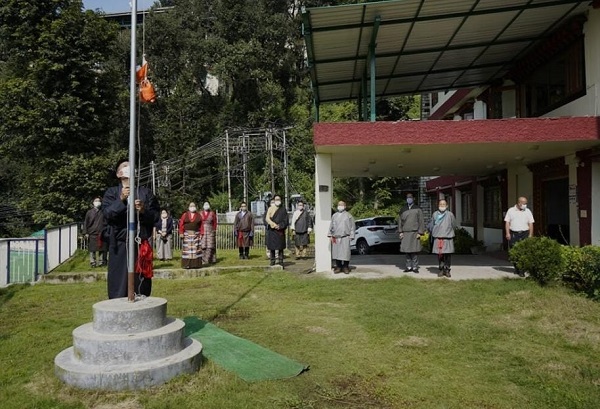Dharamsala, (Samajweekly) The Central Tibetan Administration (CTA) on Sunday celebrated India’s 75th Independence Day with its President Penpa Tsering unfurling the Indian national flag and singing national anthem here.
Expressing his admiration for the Indian freedom movement, he said: “It is a well-established history that the Indian national struggle lasted 200 years. By comparison, the Tibetan struggle is in its 70th year which is a relatively short duration. When the struggle of a nation or of a people is concerned, regardless of whether it continues for another 100 years or not, it should not deter us. We must continue to strive collectively.”
“The Indian freedom movement, for example, had both advocates of peace and violence as a means to achieve independence. However, the Mahatma Gandhi-led peaceful movement distinguished India on the international platform. The Tibetan struggle is modelled after the peaceful path advocated by the Mahatma and led by His Holiness the Dalai Lama, and the Central Tibetan Administration.
“The Tibetans inside Tibet under Chinese occupation are undergoing intense repression forcing them to self-immolate in protest at the cost of their own lives to advocate for the Tibetan cause.”
“While India won its independence and its people derived the opportunity to bask in its light, and many nations across the world after World War II won their independence, unfortunately, in Tibet’s case, Tibet came to be invaded by China when the rest of the world was gaining independence,” Tsering said.
“For the restoration of independence in the future, I urge Tibetans inside and outside Tibet to dedicate themselves wholeheartedly,” he urged.
Responding to queries from the media of the recent celebration of the 70th anniversary of the so-called Tibetan Liberation Day by China, he said, “For us Tibetans, what China celebrates as Liberation day is the anniversary of occupation and oppression.”
“The State Council recently published a White Paper on the human rights situation inside China and especially the development in the minority regions. This report only shows the progress made under the CCP while the basic inalienable rights enjoyed by people in other parts of the world that governments must protect are written off.
“Therefore, it is apparent that this report is not credible. With human rights violations still ongoing in Tibet and other regions under Chinese occupation, CCP’s claims of the liberation of Tibet begs the question from what or who was Tibet liberated? Rather than liberation, Tibetans have been languishing for the past 70 years, and it is no cause for celebration,” he added.
More than 60 years ago, some 80,000 Tibetans, along with their spiritual leader the Dalai Lama, left Lhasa after a failed uprising against Communist rule over Tibet and fled to India.
The Tibetan exile administration, called the CTA, is based in this northern Indian hill town, where the spiritual leader lives.










